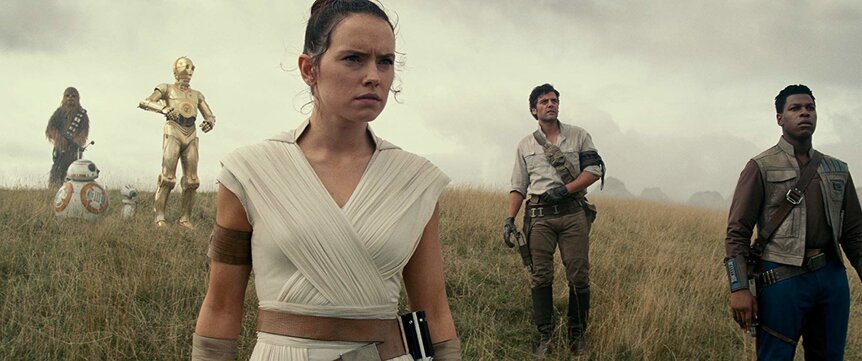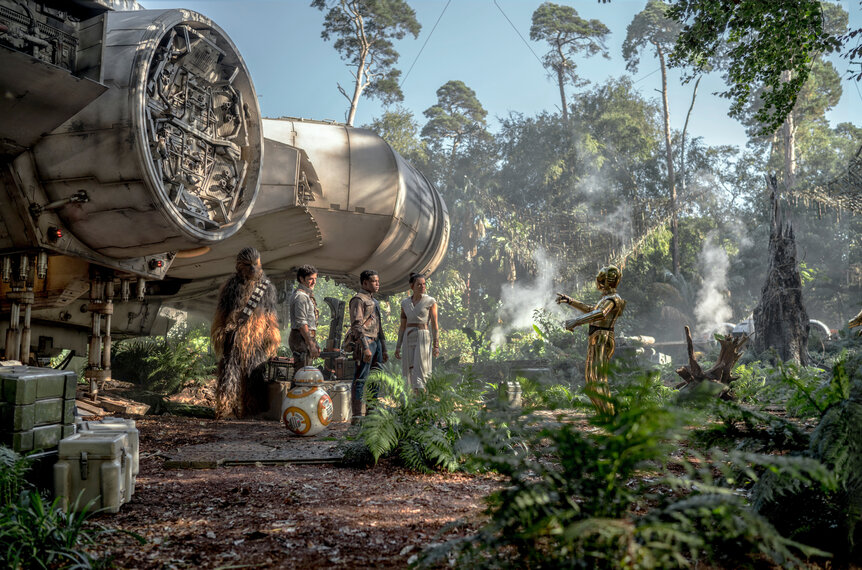Create a free profile to get unlimited access to exclusive videos, sweepstakes, and more!
The Rise of Skywalker emphasizes the importance of found family

At its core, Star Wars has been, at least in part, about the importance of legacy, and nowhere was that more clearly emphasized than in the franchise's main arc of films. When Episode IV first premiered in 1977, the familial connections between a farm boy from the desert planet of Tatooine, a bold princess from the doomed world of Alderaan, and one of the most sinister figures in the entire galaxy hadn't necessarily been sketched out yet — but in the films that followed, as well as the prequel trilogy that took us back to the very beginning, we saw those ties begin to form over the course of the narrative, and learned that most of the characters at the forefront of the Star Wars universe were linked to each other by blood. It's no wonder that the main episodes have since come to be known as the "Skywalker Saga," because each of them continues the story of this family of powerful, Force-using individuals and how the fate of the galaxy far, far away was forever changed by their decisions.
And then Rey came along.
Warning: Spoilers for Star Wars: The Rise of Skywalker within.
When we're introduced to Rey at the start of The Force Awakens, there are obvious parallels that can be drawn right away between her and Luke Skywalker — and not just because she's spent the majority of her early life on an unforgiving desert planet, but because she's always harbored her own dreams of leaving that world, that life behind. Like Luke, she doesn't necessarily have the means or the ability to make that dream happen herself, but she's also waiting for the return of people who are very dear to her: her family. Her memories of them are scarce, and we only see bits and pieces of it scattered throughout the films — certainly not enough to leave us with the impression that she represents anyone truly important, that she descends from anyone significant. At least, not at first.
It takes her rather abrupt departure from Jakku (on board the Millennium Falcon, no less, with a rogue stormtrooper and a droid in high demand by the First Order in tow) to kickstart a journey that would inevitably lead her to make even more discoveries about herself along the way, like her ability to use the Force, or her capacity to wield a lightsaber against one of the strongest members of the Dark Side. And given her own similarly humble origins, it almost makes sense that she would eventually find the path that would take her to none other than Luke Skywalker, who has spent the last several years of his life in isolation after his perceived failings as a Jedi Master. But even then, the answers she receives in The Last Jedi, about her past and where she comes from, are murky, and like Luke, she leaves before the completion of her training, drawn in by a vision she doesn't fully understand the meaning of yet.
It isn't until The Rise of Skywalker that Rey's true origins are revealed — but whatever your feelings are in regards to the narrative payoff, it's what the film chooses to suggest by the end of the trilogy, about the possibility for a new future in the Star Wars universe, that might have the most powerful message of all.
As far as Rey knows, at least until the truth is divulged to her, she's a nobody from nowhere, and it's in attempting to discover those parts of her past that have been withheld for so long that she actually finds her most significant sense of belonging — alongside her friends. Through her adventures with Finn and later Poe, it's clear by the time The Rise of Skywalker begins that the three of them have become much closer, enough to have established an obvious family-type dynamic (with Rey and Poe as the two who butt heads most often while Finn attempts to play mediator). When Rey declares her intention to seek out a Sith wayfinder in order to locate the uncharted world of Exegol, where a resurrected Emperor Palpatine is rumored to be hiding, Finn and Poe immediately insist they'll accompany her on her mission.
Perhaps Rey senses that the biggest revelation about her past actually lies ahead of her, and eventually we learn it too — that she is a descendant of the Emperor himself, hidden on Jakku to protect her so she wouldn't be raised to follow the Dark Side. But it's what Rey chooses to do with this information that proves to be the most interesting component of The Rise of Skywalker, and we see it all play out long before she decides to choose the family she's made for herself, rather than the one she was born into.
In a scene that unquestionably calls back to a similar confrontation in Return of the Jedi, Palpatine has just unveiled his plan — a secret fleet of Star Destroyers — to subsume the galaxy under his command. By then, Rey is forced to observe from a distance, helpless (or so we think), as her outnumbered friends and fellow members of the Resistance begin to fall one by one beneath the strength of Palpatine's "Final Order." Even Palpatine makes her connection to these people plain when he informs her, in no uncertain terms, that she can either align herself with him, and join the Dark Side, or she can watch her new family die.
For so long, and throughout several movies, Star Wars has seemingly emphasized the importance of blood ties. It's no surprise that some of the most powerful characters in the entire franchise are linked through their family tree, but Rey represents an important and quietly impactful shift in that pattern — because even as she accepts that she possesses a certain connection to one of the galaxy's most evil figures, she actively rejects it in the same breath. Not only does she overtly refuse Palpatine's invitation to join him and serve the Dark Side, renouncing her heritage in the process, but she chooses to preserve a different legacy — one of her own making, taking the Skywalker name as her own in order to honor Luke and Leia's memory.
It's a stirring message because of what it represents at the conclusion of a long saga of films that have primarily revolved around a single bloodline — that family can be one that we choose rather than anything we might feel obligated to claim as ours. For Rey, it's a quietly powerful choice and one that potentially signals a shift in the Star Wars universe moving forward, as well as the stories that we might get to see. Ultimately, the name of Skywalker will live on through a family that was assembled together from a band of lonely outcasts, forged in trial and hope alike, and there might not be any better legacy than that.
















